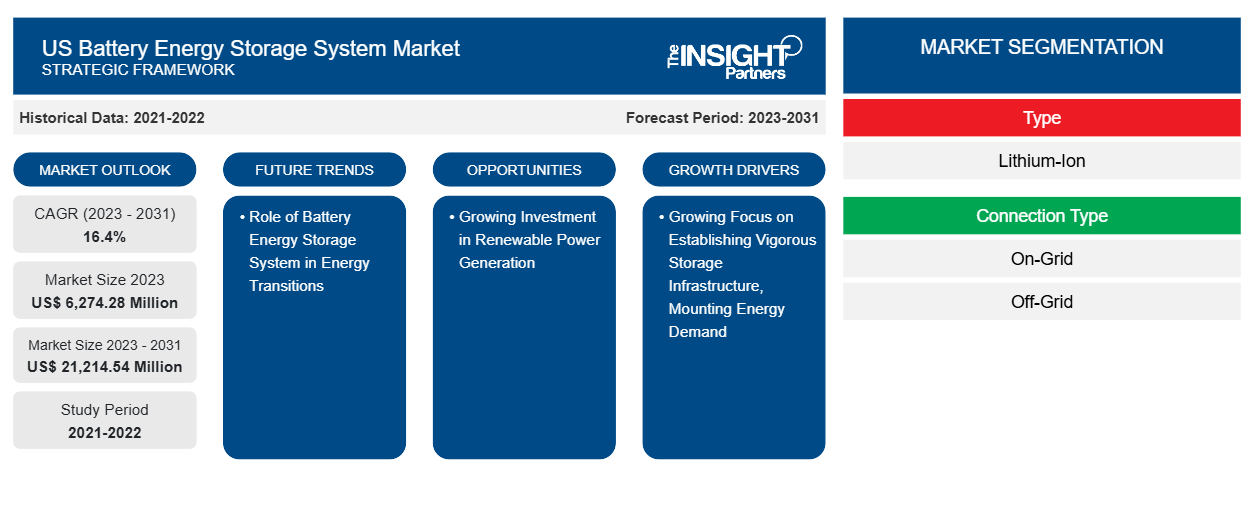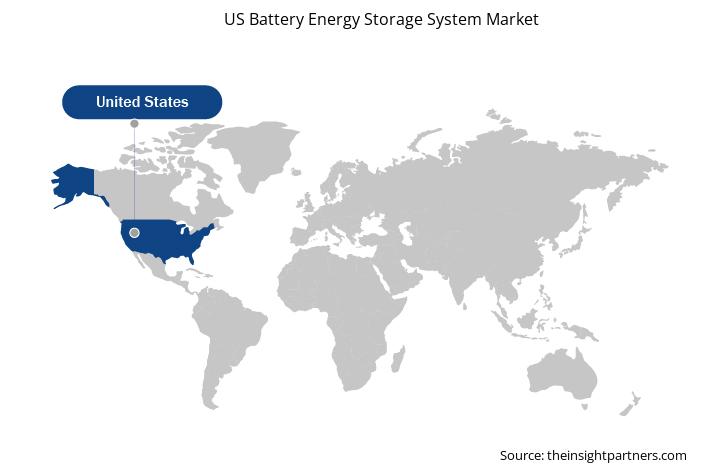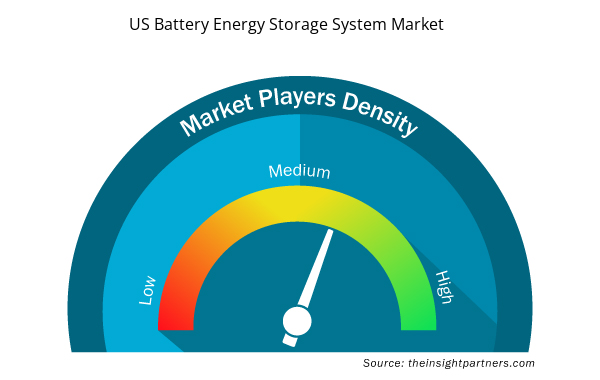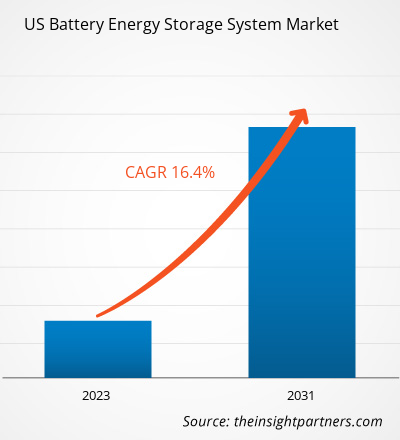The US battery energy storage system market size is projected to reach US$ 21,214.54 million by 2031 from US$ 6,274.28 million in 2023. The market is expected to register a CAGR of 16.4% during 2023–2031. The increasing role of battery energy storage systems in energy transitions is likely to remain a key trend in the market.
US Battery Energy Storage System Market Analysis
Mounting share of renewable resources in the overall power mix and strengthening emphasis on achieving zero carbon emissions in different states fuel the US battery energy storage system market growth. The unstable geopolitical scenarios worldwide have exhibited the significance of energy storage facilities in managing energy crises. In many energy storage facilities, battery energy storage is one of the most viable and cost-efficient alternatives, driving the application of battery energy storage technologies in residential, commercial, and utility sectors.
Energy producers, transmission system operators, storage providers, and end users are stakeholders involved in the battery energy storage system ecosystem. Various sources, including natural gas, fossil fuels, and renewable energy (wind and solar), are used to generate energy. After power generation comes the process of transmission and storage. The energy storage process involves large-scale facilities and distributed power or energy storage systems. The final step consists of distributing the stored energy to end users or major application areas. End users of the battery energy storage system market are power plants and the commercial, residential, and utility sectors.
The energy resources for power generation primarily include coal, natural gas, nuclear, oil, and biomass. Renewable resources consist of solar, wind, and hybrid resources. The generated energy is transmitted to end-use areas as per requirement, but the surplus amount of produced energy is stored for later usage. Advantages of using energy storage Include a balanced supply of energy, reduced costs in peak hours, and proper utilization of stored surplus energy when required. Power Sonic Corporation; Apex Clean Energy; Consolidated Edison Company of New York, Inc. (conEdison, inc.); Fluence; Tesla Inc; Xcel Energy Pty Ltd.; NextEra Energy Inc; Polystar Containment; KORE Power, Inc.; and Delta Electronics, Inc. are among the key companies that offer battery energy storage systems.
Anode, separator, Cathode, and electrolyte are primary components in a lithium-ion battery cell. Cathode raw materials such as lithium and varying combinations of typically nickel, cobalt, manganese, phosphorus, and iron are obtained from the ground, processed into metal chemicals, and then combined to generate the cathode active material. Anodes are made primarily of graphite, which is produced from naturally occurring mined graphite. Individual lithium-ion battery cells are combined to form a battery pack for BESS, electric vehicles, and any other battery applications. Battery suppliers play a crucial part in the battery energy storage system market in the US. BYD Co. Ltd., LG Chem Ltd, and Panasonic Holdings Corp are among the providers of lithium-ion batteries in the US. End users of battery energy storage systems include power plants, residential and commercial buildings, and the commercial and utility sectors.
US Battery Energy Storage System Market Overview
Battery energy storage systems can strengthen grid resilience and reliability. Battery energy storage can also ease electricity costs through arbitrage, mitigating the risk of curtailment by providing backup power. These benefits have drawn the attention of developers and the US government to focus more on battery energy storage infrastructure. State governments are increasingly incentivizing the pairing of energy storage with solar. Also, the Inflation Reduction Act (IRA) offers tax credits for installing solar-plus-storage systems and standalone battery energy storage systems, which is steering the growth of the US battery energy storage system market.
Rising energy uncertainty and growing demand for energy drive the US battery energy storage system market growth. State economic development authorities offer noteworthy incentive package strategies to lower upfront expenditure and accelerate timelines for boosting the development of the battery energy storage system market in the country.
Customize This Report To Suit Your Requirement
You will get customization on any report - free of charge - including parts of this report, or country-level analysis, Excel Data pack, as well as avail great offers and discounts for start-ups & universities
US Battery Energy Storage System Market: Strategic Insights

- Get Top Key Market Trends of this report.This FREE sample will include data analysis, ranging from market trends to estimates and forecasts.
Customize This Report To Suit Your Requirement
You will get customization on any report - free of charge - including parts of this report, or country-level analysis, Excel Data pack, as well as avail great offers and discounts for start-ups & universities
US Battery Energy Storage System Market: Strategic Insights

- Get Top Key Market Trends of this report.This FREE sample will include data analysis, ranging from market trends to estimates and forecasts.
US Battery Energy Storage System Market Drivers and Opportunities
Growing Focus on Establishing Vigorous Storage Infrastructure
The changing energy circumstances across the US are generating a demand for energy storage infrastructure. The growing energy demand displays the significance of energy storage systems. The storage system allows the storage of energy and its usage as per the requirement. Developments in energy storage systems and an increase in research and development in energy management systems are driving the battery energy storage system market. For instance, in the US, Stor4Build, an association on energy storage for buildings, is working to accelerate the optimization and deployment of storage technologies. The consortium is co-led by the National Renewable Energy Laboratory (NREL), U.S. Department of Energy (DoE), Oak Ridge National Laboratory (ORNL), and Lawrence Berkeley National Laboratory (Berkeley Lab).
In January 2024, Plus Power stated that it initiated operation at its Kapolei Energy Storage facility in Oahu, Hawaii. The plant is equipped with a grid-scale battery energy storage system, which helps in the transition of the state's electric power from coal to solar and wind. By June 2024, Plus Power is anticipated to be managing seven large-scale battery energy storage plants across Arizona and Texas for a total of 1,325 MW/3,500 MWh. Thus, the growing focus of countries on building a vigorous storage infrastructure is driving the battery energy storage system market in the US.
Growing Investment in Renewable Power Generation
The US government is focusing on reducing its carbon footprints, owing to which the energy industry is witnessing a transition toward clean energy. As a result, the government is boosting investments in green energy production. Power generation using fossil fuels is a key contributor to greenhouse gas (GHG) emissions that lead to climate change. The utilization of solar and wind energy is increasing due to rising focus on using clean and green energy, increasing climate change concerns, and rising government initiatives toward encouraging the usage of renewable energy across the US. By 2030, the US government targets to decrease net GHG emissions by ~50–52% compared to 2005 levels and achieve net zero emissions by 2050. Thus, the rise in concerns regarding greenhouse gas emissions is boosting the investment in renewable power generation, which is anticipated to propel the development of the battery energy storage system market over the forecast period.
US Battery Energy Storage System Market Report Segmentation Analysis
Key segments that contributed to the derivation of the US battery energy storage system market analysis are product and application.
- Based on type, the US battery energy storage system market is segmented into lithium-ion and others. The lithium-ion segment held a larger market share in 2023.
- In terms of connection type, the US battery energy storage system (BESS) market is segmented into on-grid and off-grid. The on-grid segment held a larger share of the market in 2023.
- Based on end user, the US battery energy storage system (BESS) market is segmented into residential, commercial, and utilities. The utilities segment held the largest share of the market in 2023.
US Battery Energy Storage System Market Share Analysis
In the US, two states (Texas and California) are increasingly expanding their solar and wind energy capacity, resulting in growing battery energy storage systems capacity in the country. As per the US Energy Information Administration (EIA), in current projects under construction or planning phase, Texas will surpass California's cumulative battery energy storage capacity in 2026, and the BESS capacity in Texas is expected to grow at a significant pace. This is owing to the increase in investment in developing renewable power projects in the region. The US battery energy storage market was valued at US$ 6.27 billion in 2023 and is expected to register a CAGR of 16.45% from 2023 to 2031, reaching US$ 21.21 billion by 2031.
US Battery Energy Storage System Market Regional Insights
US Battery Energy Storage System Market Regional Insights
The regional trends and factors influencing the US Battery Energy Storage System Market throughout the forecast period have been thoroughly explained by the analysts at Insight Partners. This section also discusses US Battery Energy Storage System Market segments and geography across North America, Europe, Asia Pacific, Middle East and Africa, and South and Central America.

- Get the Regional Specific Data for US Battery Energy Storage System Market
US Battery Energy Storage System Market Report Scope
| Report Attribute | Details |
|---|---|
| Market size in 2023 | US$ 6,274.28 Million |
| Market Size by 2031 | US$ 21,214.54 Million |
| Global CAGR (2023 - 2031) | 16.4% |
| Historical Data | 2021-2022 |
| Forecast period | 2023-2031 |
| Segments Covered |
By Type
|
| Regions and Countries Covered | US
|
| Market leaders and key company profiles |
US Battery Energy Storage System Market Players Density: Understanding Its Impact on Business Dynamics
The US Battery Energy Storage System Market market is growing rapidly, driven by increasing end-user demand due to factors such as evolving consumer preferences, technological advancements, and greater awareness of the product's benefits. As demand rises, businesses are expanding their offerings, innovating to meet consumer needs, and capitalizing on emerging trends, which further fuels market growth.
Market players density refers to the distribution of firms or companies operating within a particular market or industry. It indicates how many competitors (market players) are present in a given market space relative to its size or total market value.
Major Companies operating in the US Battery Energy Storage System Market are:
- BYD Co. Ltd
- Saft America Inc
- CATL
- Tesla Inc
- Samsung SDI Co Ltd
- Panasonic Holdings Corp
Disclaimer: The companies listed above are not ranked in any particular order.

- Get the US Battery Energy Storage System Market top key players overview
US Battery Energy Storage System Market News and Recent Developments
The US battery energy storage system market is evaluated by gathering qualitative and quantitative data post primary and secondary research, which includes important corporate publications, association data, and databases. A few of the developments in the US battery energy storage system market are listed below:
- CATL and Volvo Cars signed a memorandum of understanding on a strategic partnership to deepen the cooperation in sustainable development. According to the agreement, Volvo Cars will collect retired batteries and hand them to downstream suppliers certified by Volvo Cars for the recycling and extraction of metals, including nickel, cobalt, and lithium. CATL will use these recycled materials to produce new batteries to power electric vehicles manufactured by Volvo Cars. The two parties will also establish an efficient, collaborative, and transparent management mechanism to ensure that the entire recycling and production process meets the quality requirements of both parties and complies with the legal and regulatory requirements of various regions worldwide. (Source: CATL, Press Release, April 2024)
- General Motors Co. (NYSE: GM) and Samsung SDI announced they plan to invest more than $3 billion to build a new battery cell manufacturing plant in the United States that is targeted to begin operations in 2026. The plant will have more than 30 GWh of capacity and will bring GM's total U.S. battery cell capacity to about 160 GWh when it is at full production. (Source: General Motors Co., Press Release, April 2023)
US Battery Energy Storage System Market Report Coverage and Deliverables
The "US Battery Energy Storage System Market Size and Forecast (2021–2031)" report provides a detailed analysis of the market covering below areas:
- The size and forecast at global, regional, and country levels for all the key market segments covered under the scope
- US battery energy storage system market trends, as well as market dynamics such as drivers, restraints, and key opportunities
- Detailed PEST and SWOT analysis
- US battery energy storage system market analysis covering key market trends, global and regional framework, major players, regulations, and recent market developments
- Industry landscape and competition analysis covering market concentration, heat map analysis, prominent players, and recent developments for the US battery energy storage system market
- Detailed company profiles
- Historical Analysis (2 Years), Base Year, Forecast (7 Years) with CAGR
- PEST and SWOT Analysis
- Market Size Value / Volume - Global, Regional, Country
- Industry and Competitive Landscape
- Excel Dataset



Report Coverage
Revenue forecast, Company Analysis, Industry landscape, Growth factors, and Trends

Segment Covered
This text is related
to segments covered.

Regional Scope
North America, Europe, Asia Pacific, Middle East & Africa, South & Central America

Country Scope
This text is related
to country scope.
Frequently Asked Questions
Growing investment in renewable power generation is expected to be the key opportunity in the market.
Role of battery energy storage system in energy transitions production to stimulate the US battery energy storage system market growth in the coming years.
lithium-ion is expected to dominate the market over the forecast period.
growing focus on establishing vigorous storage infrastructure, and mounting energy demand are contributing to the growth of the US battery energy storage system market.
BYD Co. Ltd; Saft America Inc; CATL; Tesla Inc; Samsung SDI Co Ltd; Panasonic Holdings Corp; AES Corp; NextEra Energy, Inc.; Ameresco Inc.; ESS, Inc.; Siemens AG; EOS Energy Enterprises Inc; KORE Power Inc; General Electric Co; LG Chem Ltd.; SAFT Groupe SA; and ESS Inc. are the key market players operating in the US battery energy storage system market.
Trends and growth analysis reports related to Energy and Power : READ MORE..
The List of Companies - US Battery Energy Storage System Market
- BYD Co. Ltd
- Saft America Inc
- CATL
- Tesla Inc
- Samsung SDI Co Ltd
- Panasonic Holdings Corp
- AES Corp
- NextEra Energy, Inc.
- Ameresco Inc.
- ESS, Inc.

 Get Free Sample For
Get Free Sample For